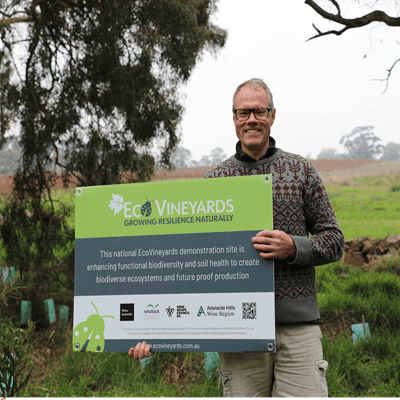Tell us in a few sentences about your experience as a viticulturist, how did you arrive here?
I started in the wine industry as cellar hand for a large commercial scale wine company and studied a Bachelor of Viticulture and Oenology with a view to becoming a Winemaker. I very quickly became dissatisfied with that position. Knowing that grape and wine quality changes with every year but never completely understanding why. I would see grapes arriving on trucks from places I had never even been to let alone appreciate the extraordinary effort that had gone into producing them to that point.
About 5 years ago, I began a viticultural traineeship and have not looked back. This year is my third season as an actual practising viticulturist/grape grower with Howard Vineyard in the Adelaide Hills.
Has there been a defining moment or catalyst for you to move towards more ecologically driven viticultural practices?
To be honest, I really don’t like driving the tractor. It’s uncomfortable, it’s loud and I see it as an unnecessary use of time and diesel. Whether it be slashing or spraying or whatever, if I can figure out a way for a sheep or a beneficial insect or a clover to do that job and keep me out of the tractor as much as possible, then that is a win for everyone.
Can you provide a brief overview of your project ideas, and what you wish to achieve over the 3 years and why is this important to you?
There are many project ideas. However, my main area of focus for the next few years is to improve grape and wine quality by improving vineyard health by improving soil health. Minimising the use of herbicides and synthetic fertilisers and encouraging a sustainable level of year round soil cover to enhance soil structure and microbial diversity. This is being rolled out across our vineyard utilising a combination of under-vine cultivation and cover cropping.
Currently we are cover cropping our mid-rows with a view to trialling cover crops under-vine for weed suppression and further soil improvement.
We are currently using sheep during the winter to keep the ground cover manageable as an alternative to slashing operations and I would like to explore the use of ducks or chickens to reduce the snail population as an alternative to pesticides.
Are you just starting to learn, or have you been enhancing biodiversity on your property and is this an extension of what you are currently doing? If so, please tell us more.
Only just starting to learn however, over the last few years, we have partnered with Hills Biodiversity and planted close to 2000 native trees and grasses on our property forming part of the Springs to Summit Habitat Regeneration Project aimed at re-vegetating the waterways and re-connecting biodiversity hotspots in the Mt Barker area.
Future biodiversity activities in and around the vineyard will be focused on planting insectaries to encourage predatory insects to habitat the area and control vineyard pests such as Light Brown Apple Moth.
Tell us about your hidden superpowers, something that others don’t know about you or a practice you would like to champion?
A real superhero never reveals their hidden superpower..
Where do you see grape growing in the future, do you feel there is an urgency to change current practices? If so, why?
I see the future of grape growing shifting away from the use of chemicals. Not all viticultural problems have to be solved with tractors burning diesel and spraying chemicals killing everything in its path. There are better more sustainable ways to grow winegrapes.

